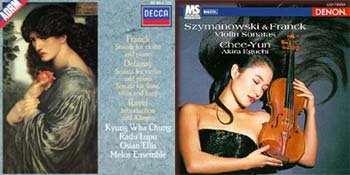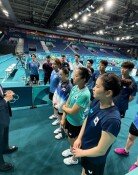Neatness Of Chung Kyung-hwa v. Clarity Of Kim Jee-yon
Neatness Of Chung Kyung-hwa v. Clarity Of Kim Jee-yon
Posted January. 21, 2003 22:40,

Sometimes poems feel like those "ordinary" words we use every day. Listening in my car to a weather forecaster saying, "The coastal area will be calm today," sometimes my throat`s getting hot with emotions and Frank`s violin sonata begins to run in my mind. Why? A little silly to ask such question. All I can say: just immerse yourself in the music.
A couple of years ago, a magazine conducted a research to figure out which work was most frequently played by Korean performers. Top on the list was Frank`s sonata A major. As music reporter, I remember this as one of the most frequently played songs. It is often arranged for performance by the cello and the flute.
Ironically, this work is not the one that people favor most for the category of the chamber music. Hard to understand, isn`t it?
In other words, performers like it most. Why does the discrepancy exist? One flutist says, "I have to change tunes a lot. But I feel attracted for that." Of course, ordinary people would not understand it easily. But the ever-changing tunes in Frank`s works convey something more than just change of notes; the changing tunes offer a new dimension where one can experience graft and exchange of different spirits belonging to different dimensions.
Two records are recommended for appreciation of this particular work of Frank: Chung Kyung-hwa and Ladu Rupu`s work that was made in 1977 using the analog technology; Kim Jee-yon and Achira Ekuchi`s one digitally recorded in 1994. Um, feel like getting the criticism from all quarters. Feel as if some were talking to me, "What`s the point in nationalism in this era of globalization."
Actually, I don`t care. With this, I can proudly brush off the criticism. However, I do not like all works of Kim. If asked, I would pick out this work and the concerto op. 3 of Camille Saint-Sans. One thing I can tell for sure about these is the quality of Kim`s performance: in a nutshell, "Extra-special."
Frank`s work becomes full of neatness through Chung`s performance. It gets closer to us with the attractive tone conveying gracious vibrato that feels as if being soaked in moisture. Rupu`s piano is refrained as well.
On the other hand, Kim`s Frank is rich, fascinating us with her uniquely clear and healthy tones, which get tense or loose from time to time. Kim feels like telling us, rushing to the final coda in a "fastened tempo," "I am alive. I will be more beautiful tomorrow."
Kim alone would not have made it possible. Ekuchi`s accompaniment creates an excellent harmony with Kim`s performance, flowing sometimes like angry waves, and other times in clam tone like the surface of water standing still. Also outstanding is the quality of clear recording, which shines like the sunshine bouncing off a clean surface.
Yoon-Jong Yoo gustav@donga.com







